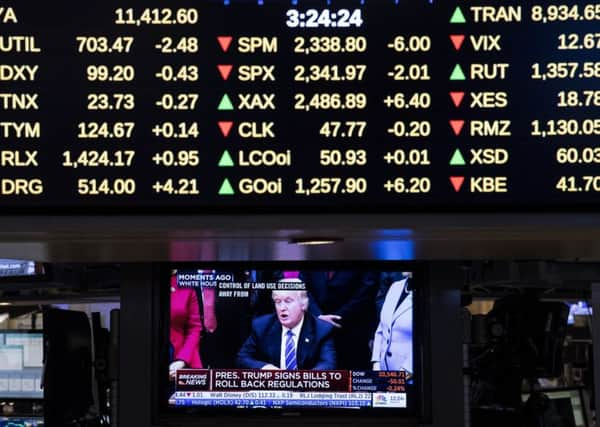Martin Flanagan: Reality check stalls Trump trade war


His inauguration speech set the tone, warning that he was not going to have any truck with rusting factories across the US landscape that he referred to vividly as industrial tombstones. True, the president has periodically returned to the subject of “America First” in corporate, military and other senses. But, thankfully, there has been no follow-through. Trump has denounced critics who call him a retro-protectionist by saying Europe, China and Japan are all more protectionist than America.
This is not a crazy lie, even if it borders on the disingenuous. Most countries put their thumb on the scales in different areas. Trump branded China the “grand champion” of currency manipulation ahead of his recent meeting with President Xi Jinping, and predicted a tough face-to-face. In the event, it seemed to go off hunky-dory, even accommodating America’s attack on Syrian airfields as the two presidents were speaking. More tea, Xi?
Advertisement
Hide AdAdvertisement
Hide AdThe truth is that despite Trump’s apparent maxim of talking loudly and carrying a big stick, global trading landscape changes have been – so far – notable by their absence. His only concrete move since taking office has been to withdraw the US from the big, but never finalised, Pacific trade deal that embraces 12 countries. It could be that setbacks in one area of policy have reverberated in another. Trump has been clearly chastened by his failure to push through his plans to scrap Obamacare, which would have been the biggest reform of healthcare for decades.
That has hamstrung his wider tax reform programme, and shown nascent signs that the Republican-dominated Congress may be every bit as staunch a counterweight to the president’s more controversial plans as the wounded Democrats. Trump’s cack-handed immigration ban on half a dozen predominantly Muslim countries has also cost him political capital.
The hope is that Trump is learning the constraints of practical politics. For instance, how could he launch punitive trade action against China, one of his economic bêtes noires, at a time when he is seeking help in tackling the dangerous escalation of tensions on the Korean peninsula? The bloody Syrian imbroglio goes on, and he admits relations with Russia and his putative best buddy President Putin are at an “all-time low”. The world’s fear is that Trump is a loose tweet and cannon. But the manner and memory of his left-field electoral victory clearly shows he has good instinctive antennae for his image. He probably feels, viscerally as much as through any intellectual process, that the last thing he needs now, on top of the bruising learning curve in office rather than the sterile pyrotechnics of being on the stump, is to launch a major hostile trade move. His more emollient talk about the European Union’s performance is significant.
As reality checks go, Trump in the White House has lived long in a short time. As well as a more America First blue collar industry policy stance and unpicking Obamacare, the other cornerstone of his manifesto is a targeted galvanising of the US economy through splurging trillions of dollars on the country’s infrastructure.
That has not been abandoned, but it has also had to take its place in the queue. As John Lennon once said, “life is what happens to you when you are busy making other plans.” Trump, despite his shoot-from-the-lip propensity, may be learning that politics is what happens to you when you are busy on your over-arching strategies.
Despite the welcome lack of a trade war, we should not be complacent. Just because we don’t have one now doesn’t mean one won’t come if things quieten down for the president in other areas. Only late last week America flagged up possible sweeping tariffs on steel imports, which would fulfil an electioneering pledge to tackle what are pretty endemic subsidies allowing the dumping of cheap steel. The latter has been one of the significant factors in the fundamental shake-up of the British and European steel industries, and so few on this side of the Atlantic can tell Trump that the problem is a figment of his imagination. We are not out of the woods as far as baleful trade protectionism goes. We don’t know what might be coming down the pike, as Americans say.
But you can only judge on what is happening. And, for now, Trump has not dropped any trade bombshell on the world despite the threatening rhetoric before his election, there’s been no paradigm shift that America’s nervous world trading partners have to deal with. Let’s hope it stays that way.
May’s Full House
If Trump has been hard to predict, Theresa May is positively inscrutable. At least financial markets and UK politicians and voters could be forgiven for thinking so. The PM was a low-key Remainer until she had to implement Brexit. She then unveiled the previously concealed streaming ribbons of her Global Britain vision. She rescued arch-rival for the Tory leadership Boris Johnson from the political wilderness by making him Foreign Secretary. And May was definitely not going to call a snap general election – until she did. One wouldn’t actually relish a high-stakes game of Texas Hold’em poker with her.